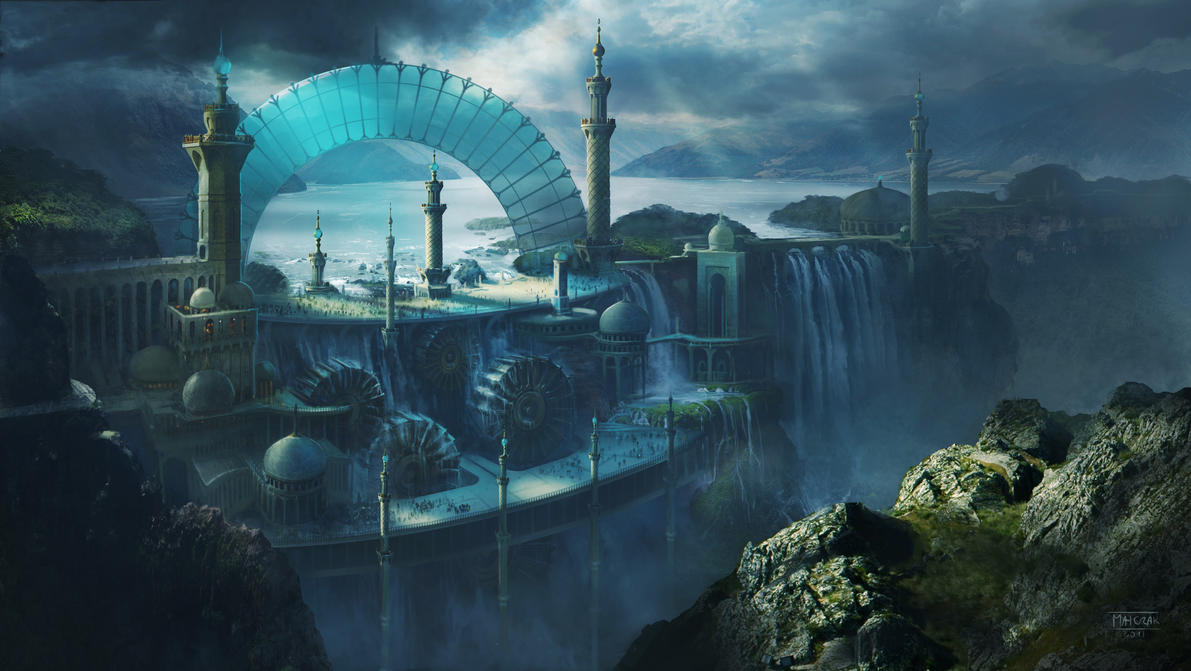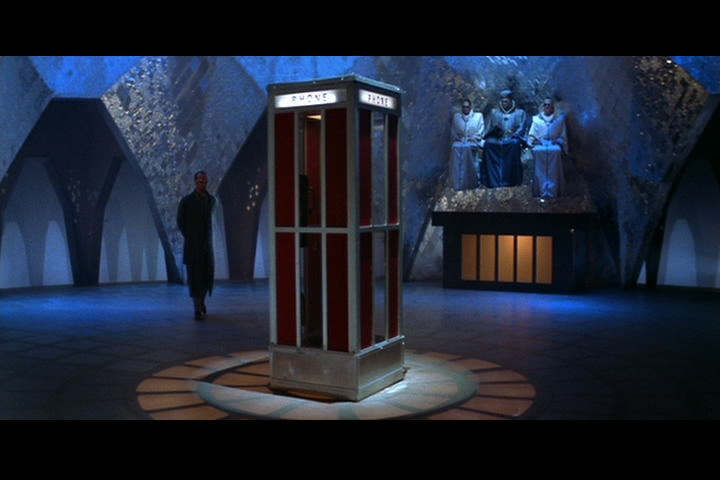 |
| Image Source: http://saretta1.deviantart.com/art/Time-Freeze-70324619. |
Time, and relative dimensions in space
Ever wonder what one of the simplest arguments against time travel is? Well consider that at no point during your life have you ever experienced absolute motionlessness. While you may have been still relative to your frame of reference you were moving quite rapidly through space. At the equator the Earth spins at a speed of about 465 meters per second (that's 1674 kph, or 1040 mph), so you are moving along at a good clip right there, even if you are fairly far to the north of the equator. The Earth revolves around the sun at 29.78 kilometers per second (18.5 miles per second) which no doubt faster than you can jog on a good day. The sun, and by extension the rest of the solar system is cruising through space on its orbit around the galactic center at a speed of 220 kilometers per second.
Suffice to say that one of the more plausible reasons for time travel to be impossible is that for each second you skip the place you were standing is going to put a couple hundred kilometers between you and it. For any meaningfully "distant" trip through time you'll also need to cover a rather large distance in space. Something a TARDIS doesn't have a problem with, but I think even the most heavily modified DeLorean is probably going to fail at.
Thankfully RPGs aren't the real world, and we can largely ignore these kinds of party pooping facts with a little hand waving.
 |
| Image Source: http://matchack.deviantart.com/art/City-Industrial-Final-390900525 |
Magic
So you want to travel through time, and due to the unfortunate trivialities of fate you were born or created into a world of magic and myth rather than science and technology. Luckily magic can still cover you. Depending on the paradigm of the magic system you may looking at certain spells geared toward manipulation of the space-time fabric, or possibly even entire schools or styles of magic that deal with time.
For general magic, spells like slow or haste could work by changing time around the target or user, for instance allowing time control to become the trappings of existing spell effects. If that paradigm uses leveled spells these are probably going to start in the mid levels and go up from there. A spell that allows the user to travel in time for more than a second or two will probably be of a very high level and/or require a great deal of proficiency and power.
On the other hand schools of magic specifically pertaining to time like Clockwork magic and Temporal magic may exist in a setting implying that control over time is more common and perhaps more common or less difficult. One would expect that a student of Clockwork magics will not need to gain multiple levels before learning the simplest of spells; at least not unless the school itself is some kind of "prestige" magic requiring mastery of other lesser schools before it can even be attempted.
In general magic just works. Maybe there is the requirement of a check to cast the spell successfully, maybe not. However, once cast successfully, spells like slow and haste will probably just work the way they always do, but spells with a grander scope, like Time Portal or Revisit the Past may have the additional requirement of a check to direct the spell properly. These are powerful effects and if you make a mistake you may jump backwards more years, or fewer, than you intended, or you may end up in the future instead of the past. A portal may likewise fail to connect to the target time, but it could also become a two-way effect, or even slip sideways into a different dimensional timeline.
All things considered you probably don't have much to worry about with regards to getting home either. Unless you don't have the spell fully mastered and need a spellbook to re-prepare the spell for a homeward journey, or you relied on a spell effect built into a device (a scroll, staff, wand, etc) then you have nothing to lose. Nothing, at least, unless magic is cyclical in your world and your trip takes you to a time where magic has waned enough that the spell to return home requires more magic than you can muster from yourself and the environment.
While I wouldn't go so far as to claim that traveling through time with magic is easy, it may be true that it is easier than doing so in other ways.
Tech
Probably the most common way to travel through time if lumped into a single category. Technological means of moving through time come in so very many shapes and sizes.
At the smallest end you have wearable devices like a Vortex Manipulator from Doctor Who, or a Legion ring from DC's Legion of superheroes. These are convenient as they minimize the user's risk of getting separated from the item. If you can wear it, you can take it with you once you get to the past or future. You might want to consider making your device look inconspicuous as well. While style is important it does you no good to get robbed for the gaudy bauble that is also your only way home.
Of course the size of a wearable device is also a potential negative. Small size means that such devices are easier to hide, and also easier to lose. Unlike a big vehicle which could be stolen but probably not well hidden a watch sized device could disappear in the hands of thief and never be seen again; not very good for your return home. Small devices may also have less robust power batteries. You'd better be certain before you leave that you have maximum charge or a way to re-charge at your destination.
The lack of full enclosure may or may not also be an issue. Depending on the specifics of time travel something you wear may end up exposing you to a very rough ride, dangerous chrono-radiation, or other forms of hazard as you move about the timeline. As a GM I look for opportunities such as these to make things interesting and add additional layers of risk and adventure.
Next you have the vehicular time machines. Note that this does not imply the machine is a vehicle through spatial dimensions, though it could be, but a vehicle through time in that it is something you can climb into and out of that travels through time with yourself, and possibly others, in tow. Being enclosed within ... whatever means that you are probably a lot better protected from the rigors of time travel than you would be with a wearable device. It's also going to be a little more difficult to lose or have stolen, but far from impossible depending on the era and the size and weight of the device.
One of the bigger advantages besides protection is that you can now take people and things along with you. Wearable devices are usually limited to the person carrying them (though it may be allowed to stress the device to carry and extra person for a single trip after which repair or replacement will be needed), but once you have a time vehicle you can bring along passengers, companions, even prisoners or booty.
At this point size begins to prevent you from blending in very well (unless you have invisibility or chameleon type features as well) and so style becomes something that may be of interest. While an icebox or a bathtub is no doubt functional it leaves a lot to be desired in terms of size and secondary features. A nice sports card is already capable of carrying two or more people around, adding time travel powers to that is a logical choice. Doing the same with a larger vehicle, a plane, boat, or even spacecraft has the potential to include more features (living space, repair facilities and supplies, library, etc) while also making said devices fairly conspicuous.
A big downside to all of this is that fuel consumption tends to increase with size, and repair becomes a greater concern as the device gets larger. A lone traveler will the skill to do so can maintain a small vehicle with little or no aid (provided they have the parts), but a damaged spacecraft or other large vehicle may quickly fall out of the scope of repair for a single individual.
 |
| Image Source: http://robertdbrown.deviantart.com/art/Terra-Nova-Portal-300822858 |
Lastly what about devices that don't travel through time, but instead create portals or tunnels in time through which people can travel. Thee device stays where it is, meaning that a return trip may or may not be possible. In some instances the time traveler may only have so much time (heh) at their destination before their unnatural existence at that point causes them to rebound to their original time. Travelers may even find that without a device capable to canceling this tendency that they cannot travel through the portals at all. Likewise it is possible that instead of snapping back to their home time the overwhelming temporal forces may tear the person apart. Aging a traveler into the future so that they "catch up" to the current time, or de-aging a traveler to the past for the same effect. In either instance this could kill the traveler, through extreme sudden old age, or by rendering them into constituent matter at the state it existed in before they were born. Temporal stresses might also simply tear the victim out of the timeline altogether like a form of paradox.
Even assuming that one can travel back safely, how does one return to their own time when the device that got them there only exists in the far future or the deep past - relatively speaking? Travel to the future may be easier to deal with, its possible the device is still available for use in the future and could send you "home" again just as easily as it did to the future. In the past you are probably going to be stuck, unless of course you planned ahead and have somebody who could open the portal home for you.
Devices like these might also act as more of a teleportation (teletemporal?) devices, meaning that there is no tunnel or portal through which a person could return through from the other end. In these instances any trave would be one-way unless there was a similar device at the other end, or a means for the device to recall in addition to its ability to send travelers. This could again require the user to have some kind of special device (a homing beacon) or be marked in some other way (a chemical or radioactive, possibly chrono-radiation, tracer). The traveler could still be lost if the device was broken or lost/stolen, or possibly if the tracer agent was flushed from their body in some way.
Natural
Time travel need not be a matter of magical skill or mechanical know-how. It's possible that in order to travel through time one must harness the raw power of nature in certain locations, or via certain phenomenon. For all the good that the DeLorean did getting Marty to 1955 it was the harnessed power of a bolt of lightning that got him home.
Black holes are one of the most powerful phenomenons in all of nature. Infinite gravity is capable of bending the fabric of space itself, capturing light, and altering the way that time passes for those within its sphere of influence. For all that we know and theorize about black holes there is a lot more we don't know. The nature of the phenomenon prevents us from actually observing them directly; we can only gather data from the matter and energy trapped in a black hole's embrace while the singularity itself lies hidden behind the event horizon.
We know that as you get closer to a black hole the warping of space-time imposes time dilation. While you observe time going by as normal those outside of the effect (or even just farther away) will see your frame of time moving slower and slower. Time is relative after all and as gravity increases time slows for the observer within the area. If you wanted to travel forward this would be a good way to do so; dip in close to a black hole and then sling yourself out. The short journey for you will have taken place at a slower pace of time than for those outside. Depending on how close you got and how quick your trip was you could skip decades, centuries, maybe even millennia or more.
But what about going backwards? In the real work we don't know that it's possible, though there are various untested theories. We don't know what goes on behind the curtain of a black hole's event horizon though and since RPGs are fiction we can start making things up. It's possible, for instance, that the singularity at the heart of a black hole may lead to any number of possible end states. Travel through time could be one of them. If gravity going up means that time passes more slowly than infinite gravity must mean that time stops (makes sense, right?). Perhaps passing through the singularity itself leads to a point outside of time and space and gravity. This exterior space might be able to see all of time and space and from there you could move about outside of the normal limitations of our universe. Eventually you could find a spot and breach back into the world, skipping backwards or forwards in time and ending up at any point in space you desired.
Black holes and singularities aren't the only ways that nature may allow you violate the normal flow of time however. Wormholes bridge two points in space, but if it was possible to keep a wormhole open and move one of its ends you could create a bridge between times as well.
Open a stable wormhole in the year 2100. Take your fastest ship and tow one end of the wormhole (end A) behind it while leaving the other (end B) to orbit Earth. Your ship now accelerates to it best speed; let's say that that is 90% the speed of light. The ship goes off at incredible speed on a journey that will take it one thousand years of time relative to Earth. When the ship returns in the year 3100 the crew, the ship, and the end of the wormhole that was being towed have experienced a mere fraction of that thousand years because of the relativistic speed they were moving at. I don't know how to do the math but let's say that for the crew their little jaunt around the galaxy and back felt like only one year. That means that while wormhole end B dumps out on the year 3100 wormhole end A terminates at the year 2101, meaning that you have built a time travel bridge of 999 years.
Other natural tunnels through time could exist. A tear in time could be the result of paradox, allowing people to pass between the past and future times that caused the paradox itself. A rift in time like this could possibly be a bootstrap where a traveler from the future comes to the past via other means, creates a paradox that results in a temporal tear connecting past and future. People begin to use this portal as a natural resource of sorts until at some point in the future it collapses. The future society puts resources into inventing time travel via other ways and sends somebody back in time to find out what happened to the time tear. They cause a paradox which brings us right back to the beginning and the creation of the time tear. In such a timeline the rift in time is its own cause as it was a direct result of the portal closing that lead to a traveler to go back and cause the paradox that created the rift in the first place.
I'm sure that I am probably forgetting something important or glossing over something I meant to go into more detail on but this has proven longer than expected (2700+ words). I continue to hope that you all are enjoying this mini-series and getting something useful out of it; I know I am.
As is always the case I am more than willing to hear your thoughts on the matter. Did I miss something? Have I made a mistake? Please let me know. Meantime, for the next article in this series I will be planning to discuss changes to the timeline, and the damage that such actions can potentially cause.









cool
ReplyDeletesure about that